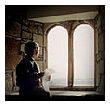Home »
Posts Tagged "Hymn to the Logos"
Posted by Anne on Jun 7, 2013 in Mathing | 2 comments
This is the last of this series.
Appropriately, it’s the seventeenth.
So I just thought I’d mention a couple of my favourite multiples of 17 in Scripture, along with some other random significant seventeens I haven’t looked at very closely.
(1) Currently the top of my favourites among the seventeens is the 1717 references to ‘land’ across the Old and New Testaments. Now 101 in medieval times appears to have been a metaphor for the Music of the Spheres, the sustaining song of the angel host. It looks to me like Paul uses it that way to book-end Ephesians as well. As it happens ‘land’ and ‘song’ evoke the Australian aboriginal concept of connection to the land and songlines in the landscape. So pardon me if I sum up 1717 as a mathematical metaphor for ‘the songlines of the Lord’.
read more
Posted by Anne on May 24, 2013 in Mathing | 2 comments
Ἐν ἀρχῇ ἦν ὁ Λόγος, καὶ ὁ Λόγος ἦν πρὸς τὸν Θεόν, καὶ Θεός ἦν ὁ Λόγος
En archē ēn ho Lógos, kai ho Lógos ēn pros ton Theón, kai Theós ēn ho Lógos
In the beginning was the Word, and the Word was with God, and the Word was God.
Seventeen words, in both Greek and English. This is the marvellous poem that opens John’s gospel and is sometimes called the ‘Hymn to the Logos‘.
read more
Posted by Moderator on May 13, 2011 in Mathing | 0 comments
The prologue and epilogue to John’s gospel are clearly defined literary sections. The opening, sometimes called the Hymn to the Logos, is composed of 496 syllables while the ending is 496 words in length. So far we’ve looked at five reasons why John might have chosen to highlight this number in order to make a persuasive and compelling ‘numerical literary’ apologetic. It might not impress the average post-modern thinker who grew up in a world where arithmetic and language are completely different subjects. However, even two millennia after it was written, its word-number fusion still retains enough of the ‘wow!’ factor to stop more than a few skeptics in their tracks.
So far we’ve looked at five reasons why John might have chosen to feature 496:
(1) It’s a ‘perfect’ number.
(2) It’s a ‘triangular’ number.
(3) The mathematical structure recalls that of the Immanuel prophecy.
read more
Posted by Moderator on Mar 31, 2011 in Feature, Mathing | 1 comment
Mention the word ‘mathematics’ and most people tend to squirm. But I love the subject and I delight in finding it in unexpected places. I’m always thrilled to discover a new spot where God has pulled out all stops in a virtuoso display of numeracy.
Most people don’t cope well on being told the Bible is full of mathematics. They think numeracy equals numerology. But they are as different as astronomy and astrology.
read more


